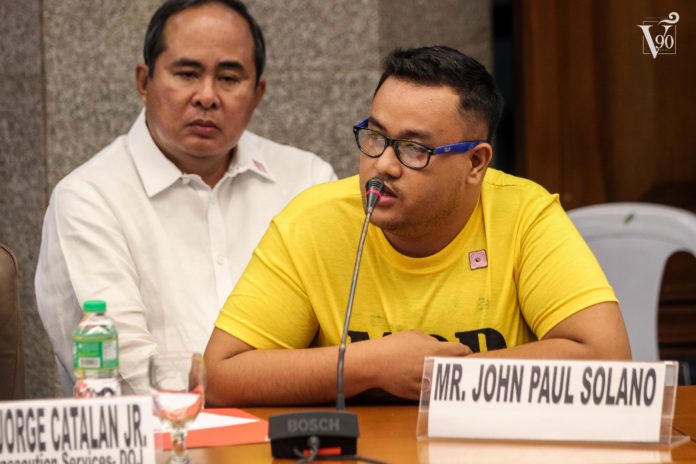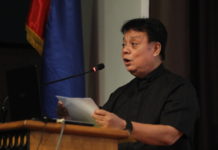ONE OF the main suspects in the death of freshman law student Horacio Castillo III revealed the names of at least six individuals involved in the Aegis Juris Fraternity hazing rites, Sen. Juan Miguel Zubiri said on Tuesday, Sept. 26.
John Paul Solano disclosed the names in an executive session last Sept. 25 after a Senate probe into Castillo’s death.
“Ibinunyag niya ‘yung nangyari nung umagang ‘yun at nag tell-all siya sa amin…he named at least six frat members,” Zubiri told reporters.
Zubiri said he was convinced Solano was telling the truth.
“Mabigat ang mga impormasyon na ibinigay niya para sa kasong ito and makakatulong ito sa [Manila Police District] to solve the case,” he added.
Zubiri appealed to the Manila Police District (MPD) and the Department of Justice (DOJ) to “follow proper procedures” and not rush the filing of criminal charges against Solano.
“Although we want this case resolved immediately, we can’t shortcut procedures. Kasi ‘pag shinortcut po [‘yung] procedures baka mabulilyaso [‘yung] kaso. Baka instead na makulong ang mga [suspects], makalusot pa sila due to legal technicalities,” he said.
Zubiri, a grade school classmate of Castillo’s father Horacio Jr., also said UST Faculty of Civil Law Dean Nilo Divina swore to “facilitate the surrender of these individuals.”
“Sabi ko sa kaniya, please help the family [and] ‘wag niya pagtakpan ito…he seems to be very assuring and sincere in wanting to clear the name of the frat,” he said.
“[L]ahat ng organization may bad eggs e…according to him [there are many] good Samaritans of the frat and sorority (Regina Legis et Juris Sorority) [who want this issue] resolved immediately,” he added.
Related: ‘We will leave no stone unturned’: UST vows justice for law freshman kille din hazing rites
Not present during hazing
Solano, a medical technologist, said during the Senate probe he was not present during the hazing rites, and was only tasked to revive the 22-year-old hazing victim in the Aegis Juris library at 6:30 a.m on Sunday, Sept. 17.
Read: Dumped on a sidewalk in Tondo: UST law freshman dead after hazing rites
He claimed he was ordered to accompany his frat brothers in bringing the body to the Chinese General Hospital.
“When we were ready to go to Chinese General Hospital at around 9 to 9:15 in the morning, [the frat brothers told me to [lie] and I was very rattled that time and was very confused on what to do,” Solano told lawmakers during the probe.
Asked by Sen. Richard Gordon why he did not bring Castillo to UST Hospital, which was closer, Solano insisted he was only following orders from fraternity members.
“I was the one who initiated that the victim should be sent to the hospital and the [frat members] chose Chinese General Hospital and said I should just follow,” he said.
Solano, 27, who is on leave from his studies at the UST Faculty of Civil Law, claimed he did not know who Castillo was.
“Di ko kilala si Castillo…’di ako active member sa [Aegis Juris]…[The fraternity members] told me that I should go [to the library.] They told me someone collapsed,” he said.
Initially, Solano was considered a witness by MPD after he told authorities he found Castillo’s body in Tondo last Sept. 17.
Last Sept. 20, MPD named Solano, along with fellow Aegis Juris member Ralph Trangia and his father Antonio Trangia, as the main suspects in the death of Horacio. The Department of Justice then released a lookout order for 15 other members of the fraternity allegedly involved in the hazing rites.
Read: Lookout order issued vs Aegis Juris Fratmen
MPD Director Joel Coronel said Solano gave false information to the police when he said he found the body of Castillo in Balut, Tondo in the morning of Sept. 17. CCTV footage in the vicinity showed no body was dumped in the area at that time.
Solano surrendered last Sept. 22 to Sen. Panfilo Lacson, chairman of the Senate Committee on Public Order and Dangerous Drugs, who led the Senate probe.
Read: Suspect in hazing death of UST law freshman surfaces
Solano was then charged by the MPD with murder, perjury, obstruction of justice, robbery and violation of the Anti-Hazing Law, along with other suspects in Castillo’s death.
Read: Murder, hazing, roberry charges filed against aegis Juris fratmen
What Divina, faculty secretary knew
Asked by Gordon if they immediately knew of Castillo’s death, Civil Law Dean Nilo Divina, Faculty Secretary Arthur Capili and Asst. Prof. Irvin Fabella, all “inactive”members of Aegis Juris, said they found out about the incident past noon on Sept. 17.
Related: Civil Law dean says he’s on leave from frat, not aware of hazing rites
“The faculty secretary told me [about Castillo’s death] at 12:15 p.m. and I asked to confirm further and get more information on the death of the neophyte and at around 6 p.m., [it was confirmed that] a neophyte indeed died,” Divina said.
On Sept. 18, a text message from an anonymous sender notified the parents of Castillo, Horacio Jr. and Minnie Castillo, that their son was brought to the Chinese General Hospital on Blumentritt Street in Manila.
Gordon, chairman of the Senate Committee on Justice and Human Rights, said Divina should have alerted the UST administration and Castillo’s parents after he got the information on the hazing incident.
“You knew last Sept. 17 [about Castillo’s death.] I’m sure you could’ve called the leaders of UST because you know you are a lawyer and possibly, UST might get sued,” Gordon said.
Gordon said the parents of Castillo also had the right to know of their son’s whereabouts.
Divina replied that he did not get the full name and address of the neophyte.
“[The faculty] only knew the surname but not the complete name. The records are in the [Civil Law] office and it was Sunday [so the] offices were closed,” Divina said.
‘Hazing banned in UST’
Divina claimed he abolished violent initiation rites such as paddling in 1988, when he became a member of the governing body of the Aegis Juris Fraternity.
“I was able to convince the officers of the [Aegis Juris Fraternity] to remove hazing. I was able to remove [the use of a] paddle as part of initiation rites. I said let’s concentrate in determining the resolve of neophytes through other means [such as] preparing case digests,” Divina said.
Divina pointed out that hazing rites in all fraternities and sororities are banned by the UST administration.
Last Feb. 24, the Civil Law Student Welfare Development Board released a memo ordering all fraternities and sororities in the Faculty not to recruit freshmen, and to “strictly follow the Anti-Hazing Law.”
“Freshmen students must be given the opportunity to reasonably and intelligently determine the status of the organizations they would like to become members of,” the document read.
Violators of the guidelines will be subject to disciplinary action and sanctions based on the UST Student Handbook.
Aegis Juris not recognized
Office of Student Affairs Director Ma. Socorro Guan Hing told senators Aegis Juris was not a recognized fraternity for Academic Year 2017-2018.
Sen. Risa Hontiveros, however, said there could be weaknesses in enforcement in UST after Solano admitted he underwent hazing rites when he joined the fraternity two years ago.
Divina said “one incident does not mean weakness of policy. There is a policy and sanction that have been imposed and will be imposed.”
The Student Handbook’s section on the “Maintenance of Peace and Order” states that Thomasians are expected to give due regard to rules and regulations of the University, which prohibit “engaging or getting involved in any hazing or inter-fraternity or sorority disorder or brawls, whether inside or outside the campus.” Violators will be subject to disciplinary action after an investigation.
The handbook also cites Republic Act (RA) 8049 or the Anti-Hazing Law of 1995, which defines hazing as an “initiation rite for admission into membership in a fraternity, sorority or organization by placing the recruit in some embarrassing or humiliating situations such as subjecting him to physical or psychological suffering or injury.”
‘Ban hazing, not initiation’
Divina said hazing should be banned completely, but initiation rites should still be allowed.
“Initiation that does not cause any psychological harm and physical injury to the neophyte should be allowed because there are many ways to determine the resolve of a [new recruit] without subjecting [them] to psychological harm and physical injury,” he said.
Zubiri, however, insisted on repealing the Anti-Hazing Law of 1995 because it does not ban hazing rites.
Read: SPECIAL REPORT: Senators vow to repeal ‘weak’ law, abolish hazing
In a statement, former senator Jose Lina, a UST alumnus and author of the Anti-Hazing Law, earlier blamed the confusion on the law on its title, which he said was adopted by a congressional bicameral conference committee when he was no longer part of the Senate.
“Be that as it may, legal minds agree that the title of a law is not the law itself. As pronounced in Supreme Court rulings, what is controlling in interpreting a law are the provisions themselves, or the body of the law itself, and not the title,” Lina said.
The law imposes a minimum of prison correccional or imprisonment of 4 years, 2 months, and one day up to 6 years for a hazing activity that causes little to no injury, Lina noted.
It also requires a notice to authorities, seven days before initiation rites are conducted, and “shall further contain an undertaking that no physical violence be employed by anybody during such initiation rites.”
“Unfortunately in the enactment of the Anti-Hazing Law in 1995, only one conviction has been decided by the court. We should put a stop to this senseless death to hazing once and for all,” Zubiri said.
Zubiri was referring to the Supreme Court decision in 2015 convicting two Alpha Phi Omega fraternity members who violated the Anti-Hazing Law and killed University of the Philippines-Los Baños student Marlon Villanueva in 2006. with reports from Theodore Jason Patrick K. Ortiz and Winona S. Sadia
To investigate and expose unspoken issues and anomalies, send confidential news tips to the Special Reports team of the Varsitarian at specialreports.varsitarian@gmail.com or at THE VARSITARIAN office, Rm. 105, Tan Yan Kee Student Center, University of Santo Tomas, España, Manila.




















